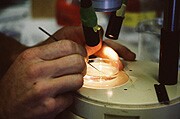
THURSDAY, June 7 (HealthDay News) — A fatty membrane in the belly long believed to serve little purpose may actually play an important role in immune system regulation, according to a new study using mouse cells.
The finding might one day lead to new drugs for organ-transplant patients and people with autoimmune diseases such as lupus and Crohn’s disease, said the researchers, from the Loyola University Chicago Stritch School of Medicine.
The membrane, called omentum, lines the abdominal cavity and covers most abdominal organs; it also is a repository for fat tissue. In lab experiments with cells from mice, the researchers found that omentum cells appear to secrete a substance that can reduce the activity of the immune system.
The study was published June 6 in the journal PLoS One.
“We now have evidence that the omentum is not just fat sitting in the belly,” the study’s corresponding author, Makio Iwashima, an associate professor in the microbiology and immunology department, said in a university news release.
The finding could aid the development of new drugs that would suppress the immune system with fewer side effects than the current drugs used to treat organ-transplant patients and people with autoimmune diseases, in which the immune system attacks the body, the researchers said.
The researchers also found that the omentum contains a type of stem cell that travels to the site of an injury and helps regenerate tissue.
Research involving animals should be considered preliminary because the results often don’t have implications for humans.
More information
The U.S. National Institute of Arthritis and Musculoskeletal and Skin Diseases has more about autoimmune diseases.

